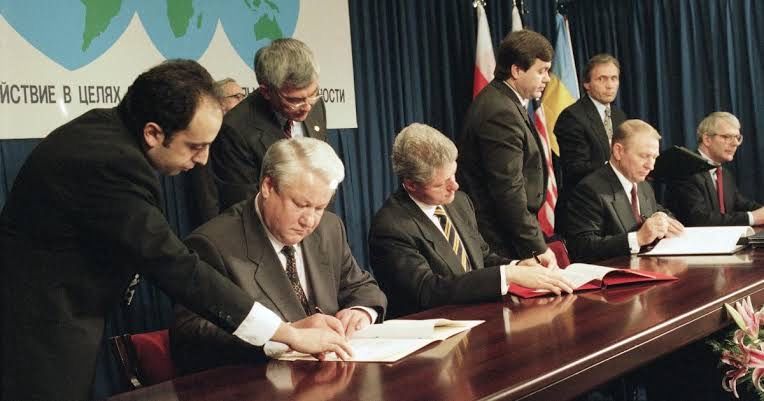Budapest Memorandum on Security Assurances
The Budapest Memorandum on Security Assurances refers to three identical political agreements signed at the OSCE conference in Budapest, Hungary on December 5, 1994. The signatories were Ukraine, the Russian Federation, the United Kingdom, and the United States. The Memorandum provided security assurances against threats or use of force against

The Budapest Memorandum on Security Assurances refers to three identical political agreements signed at the OSCE conference in Budapest, Hungary on December 5, 1994. The signatories were Ukraine, the Russian Federation, the United Kingdom, and the United States. The Memorandum provided security assurances against threats or use of force against the territorial integrity or political independence of Ukraine.
Here are the key points of the security assurances as outlined in the Budapest Memorandum:
- Respect Ukrainian independence and sovereignty within its existing borders. The signatories agreed to respect the independence, sovereignty, and existing borders of Ukraine, meaning they would not attempt to change the status of Ukraine through force or political coercion.
- Refrain from the threat or use of force against Ukraine. The signatories pledged that none of them would use or threaten to use force against Ukraine's territorial integrity or political independence.
- Refrain from using economic pressure on Ukraine in order to influence its politics. The memorandum stipulates that the signatories should not use economic pressure on Ukraine in order to have a say in its political matters.
- Seek United Nations Security Council action if nuclear weapons are used against Ukraine. In the event that Ukraine became a victim of an act of aggression or an object of a threat of aggression in which nuclear weapons were used, the signatories would seek immediate United Nations Security Council action to provide assistance to Ukraine.
- Refrain from the use of nuclear arms against Ukraine. The signatories, notably the nuclear powers Russia, the United Kingdom, and the United States, would refrain from the use of nuclear weapons against Ukraine.
- Consult with one another if questions arise regarding these commitments. The memorandum includes a commitment from the signatories to consult with one another if any questions arose regarding these commitments.
It's important to note that while the Budapest Memorandum contains a series of commitments, it does not have the force of an international treaty and is not legally binding. Its breach, such as Russia's annexation of Crimea in 2014, therefore did not automatically trigger legal or military responses.
The Budapest Memorandum outlines that if Ukraine were to be subject to an act of aggression, or even the threat of aggression where nuclear weapons are involved, the countries that have signed the agreement would seek prompt action from the United Nations Security Council to assist Ukraine.
To break this down further:
- Act of Aggression: This refers to an act that involves a military attack, or a series of attacks, by one country on another. In the context of the Budapest Memorandum, if Ukraine were subject to a military attack involving nuclear weapons, this clause would be invoked.
- Threat of Aggression: This does not need to involve an actual military attack. If a threat were issued by another country to use nuclear weapons against Ukraine, this clause could also be invoked.
- United Nations Security Council: This is the most powerful body within the United Nations. It has the authority to make legally binding decisions that member states have agreed to carry out. If Ukraine were subject to a nuclear attack or the threat of such an attack, the signatories of the Budapest Memorandum would go to the UN Security Council seeking its intervention.
- Action to Assist Ukraine: This can be interpreted in different ways and is not defined in the text of the Memorandum. It could include diplomatic interventions, sanctions against the aggressor, or potentially military intervention. However, it would ultimately be up to the Security Council to decide what action to take, which would require the agreement of at least nine of its fifteen members, including the agreement of all five permanent members (China, France, Russia, the UK, and the USA).
While the Memorandum is clear on seeking UN Security Council action, it does not guarantee any specific kind of assistance. What assistance Ukraine would receive in such a scenario would be contingent on the particular circumstances at the time and the decisions made by the UN Security Council and the international community.




